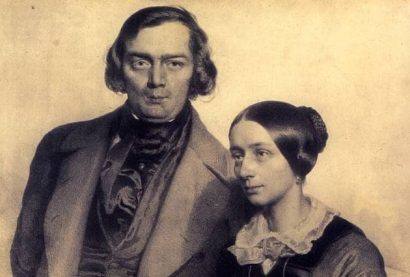A female music prodigy and male composer fight for their love, doing anything up to and including suing the woman's father. It sounds like something straight out of a romance novel, but for Clara and Robert Schumann, this was their life.
A prodigy is born
While Robert Schumann had been born in 1810 in Zwickau, Clara Wieck was born late in Leipzig in 1819. Her father Friedrich primarily trained her in piano during her childhood. Her mother was absent from her life due to a divorce when Clara was only five.
Clara trained daily with one-hour lessons from her father followed by two hours of practice every day. While tough, the training paid off and she had her debut performance in 1828 at the Gewandhaus in Leipzig. She was only nine years old.
Meeting of the musicians
In that same year she would go on to perform once again in Leipzig. This time it was at the home of Ernst Carus, director of the mental hospital at Colditz Castle. It was also here that none other than Robert Schumann himself was in attendance. Impressed by Clara's playing, Robert asked his mother's permission to stop studying law. He wanted to take music lessons under Clara's father Friedrich instead. His mother agreed and he studied underneath Friedrich for a year before returning back to his law studies.
He could have continued on the law track, but the allure of music pulled at his heart strings once again. So, in 1830 Robert decided to quit his law studies for good and continue underneath Friedrich Wieck. Friedrich was encouraging, telling Robert that he could become a master musician in a few years’ time. Unfortunately, this would never come true; in his early 20s Robert would suffer a hand injury, ending his career as a pianist. Undeterred, he decided to dive into the world of music composition where his hand injury mattered little.
Falling for Clara
As he delved further into composition, Robert began to feel a growing affection for the now 15-year-old Clara. Over the next years their feelings grew together and, in 1837 when Clara was 18, he proposed to her.
She ecstatically agreed, but her father disapproved of the whole thing, denying their ability to marry. And while many may have given up at this point, Clara and Robert were not the type. Instead, they decided to sue her father for their right to marriage. A legal battle started that would go on for three grueling years.
A love kept secret
During this battle, Clara and Robert continued to send love letters and meet in secret. Robert would often wait hours in a cafe nearby after one of Clara’s concerts. Their prize: a few minutes of much valued time together. Sneaking around was labor-intensive though, and some have speculated that the emotional hardship they endured led Robert Schumann to his large creation of Lieder — poetry set to classical music.
But their hardship could only last for so long and, fortunately for them, their efforts were finally rewarded in 1840. They won the legal battle against Clara’s father and finally married in September.
Meet the Schumanns
Over their marriage Clara taught piano and went on concert tours while Robert kept composing. While already impressive, it's even more so considering they also somehow managed to raise their eight children. Happily married, the relationship was unfortunately cut short when Robert threw himself from a bridge into the Rhine River after being driven mad by demonic visions in 1854. Though he survived, his mental health continued to rapidly deteriorate until his early death in 1856. His last written piece was Geistervariationen, or Ghost Variations in English.
After Robert’s tragic death, Clara went on to regularly perform. She would play in Britain, Edinburgh, Glasgow, and her homeland of Germany over the next decades. She'd even play into the 1870s and 1880s. Her final concert was on March 12, 1891 in Frankfurt. Her final song played was Brahms’s Variations on a Theme by Haydn with James Kwast.
The end of Clara
Clara, her life lived to the fullest, passed away at the age of 76 in 1896. It was 40 years after her husband had died. She was buried next to Robert, leaving a legacy of her virtuoso performances and teachings to people like Carl Friedberg. A German pianist and teacher, Carl spread those very same teachings to The Juilliard School in New York City.
And while both Clara and Robert Schumann may be gone, their love and devotion to each other still live on in a diary they kept together during their marriage. Filled with entries about their lives and their desires and accomplishments in the arts, it’s clear that they were more than just a couple; they were a team.
Photo - https://bit.ly/33WDwY8
For more stories like this, subscribe to our newsletter!
For stories from living artists, check out our webinars!

